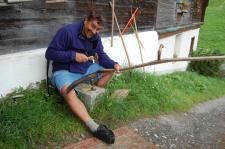Every two years my guidebook research brings me to my favorite corner of the Swiss Alps, as I visit my friends who run the little places that accommodate my traveling readers in the tiny village of Gimmelwald.
Walter, who runs Hotel Mittaghorn, is 82 now…slowing down but shuffling on. To most people, he just giggles and muses about this and that incomprehensibly. But it all makes sense to Walter. Tim from Britain looks after Walter and the hotel. Tim’s in a brace after a parasailing accident. Hard landings seem to make him seem shorter each year I visit. We have our annual meeting to lighten Walter’s workload. A new fire regulation cuts his hotel capacity to 15 — a blessing. Later, in the village center, I meet a stream of Walter’s guests…all thrilled to stay at Hotel Mittaghorn.
Down in the town, I drop in on Olle and Maria, the school teachers who share the 120-person village’s single teaching position. They cut me some hard alp cheese as we review their B&B business. Maria says she doesn’t understand why, in 12 years, they’ve never had a black visitor from the US. She promises to give a free room to the first black American family that comes. I wandered how that offer would look in my guidebook. I joked I wanted the offer for all black people for an entire year. (Anyway…if you’re a black American, you’ve got a free room here in paradise!)
I drop in on Esther, the dynamo farm girl who now, with her expanded guesthouse, has the biggest business in the village. She asked if my describing her place as an “upscale mini-hostel” wasn’t a bit off. I agreed.
Esther also rents rustic spots across the street in her barn. She’s received some complaints, and was concerned we were overselling it in the guidebook. She asked, “Shouldn’t we call it a ‘stable?’ And you should tell of the smell and the flies. Americans don’t handle flies well. It smells like a barn — manure. You must tell them directly.” With my new, more frank write-up, I told her, “If anyone complains, it’s their own fault.”
 |
|
Enlarge photo
|
My favorite visit in the village is the Mountain Hostel run by Petra. After dark it’s a glowing light of travel happiness in this sleeping village. It was filled with a likable, well-scrubbed gang — kids any parent would be thrilled to see their teenager hanging out with. Everyone seemed to be instant friends. I meet a Jeremy, a 15-year-old with his dad. He was immersed in a raucous world of 18-to-25 year-olds with the world by the tail. This was his first hostel…we celebrated the fact. A college student from San Diego with big hair, “carpe diem” tattooed on his underarm, and a determination to be a great high-school teacher, joined in the conversation. All agreed the world needs more “Dead Poets Society” teachers. The topic turned to whether history as taught in the USA is ethnocentric. A woman who left her five-year-old daughter sleeping in the barn (swatting flies), said, “I’m a history teacher”…and joined in the conversation.
I met with Petra — sitting in the kitchen while she cooked up her famous pizzas. She grew up by the hostel in the next village, and remembered loving the way American couples called each other “honey.” She married local boy Wally, and they did wonders making the Gimmelwald hostel the money-less mountain-lovers’ El Dorado it is today. As a courageous woman with a vision, she ruffled village feathers. Her father-in-law never even visited the work of Wally and Petra for years.
Petra’s only request for the next edition of the guidebook: Shame the guys into splitting lumber for the wood-heated hot tub. I stepped out back to a gleeful gang of happy hikers in a half-barrel-design hot tub. Standing in the tub posing for photos, they looked like a bundle of white asparagus. As I always say, “If heaven isn’t what it’s cracked up to be…send me back to Gimmelwald.”
 |
|
Enlarge photo
|
An artist sketched a funny cartoon entitled “The Adoration of Rick Steves” with hostellers using my guidebook like the Bible. And it occurred to me: If any place was a springboard for my career, it was this hostel back in the 1970s.
When I first came in 1976, goats lived downstairs. Bent old Lena (who sounded like a goat when she talked) would hobble over once a day and collect two francs. Today it may cost 25 francs to sleep here — but Gimmelwald hostel provides the same magic. I told Petra she should have a photo of Lena on the wall. She pointed to the space above the bar…and there she was.
Lena’s gone. There’s not only a shower…but a hot tub. And a generation after me, the essential magic of slumming it in the Alps is unchanged. Walking home through the darkness, I could almost hear the gnomes of Gimmelwald cheering me on. My work brings me great joy.



